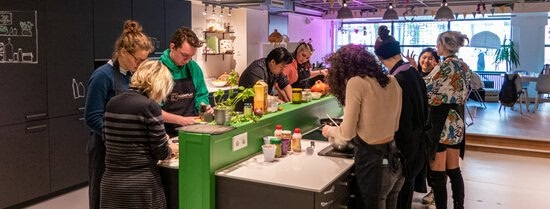Almost everyone is aware of the enormous impact our consumption has on the environment. But what can you do about it as an individual in daily life? Erasmus alumna Pinar Coskun, project manager of the Erasmus Food Lab, advises students and staff in making sustainable choices when it comes to food. With scientific support.
What is the mission of the Erasmus Food Lab?
"We want people to think about their food. That they see that you can eat tasty, healthy and sustainable food. Because animal food in particular has an impact on the environment, we are vegan. Students are interested in this, which has grown enormously in five years. In the past, when I was approached and said: 'we are organic vegan, you could taste a little hesitation. Now they say: 'Yes, but that is exactly what we want'".
"As Food Lab, we give cooking workshops and organise events to learn how to cook delicious, healthy and plant-based food with good recipes and where there is room for questions such as: do you lack nutrients if you no longer eat meat? For students, it is a quest: how do I make the switch in a healthy way? After that, it goes very quickly. The great thing is that the cooking workshops are set up by me, but led by the students themselves."
How is the Food Lab linked to science?
"All our projects involve scientists from Erasmus University. For example, we do the Beyond Me Challenge together with Sergio Mugnai [biologist and senior lecturer at Erasmus University College], where students eat vegan for a month. Among other things, they get advice on how to replace meat without suffering from a protein or iron deficiency. We have many links within the university; they often grow into something concrete. That may be advice, guidance, a subject in education or an event. Such as the Zero Waste Week, where professors come and talk about waste in the food but also in the fashion industry."
"Furthermore, we have a link with the student organisation SELF of Liesbeth van Rossum of Erasmus MC. She is specialised in obesity, healthy weight and lifestyle-related diseases. Because medical students learn relatively little about nutritional advice during their studies, Liesbeth has developed an extracurricular programme. We do the practical work and provide seminars. Derk Loorbach [Professor of Socio-Economic Transitions at Erasmus School of Social and Behavioural Sciences] with his organisation Design Impact Transition is also an important partner for us. With him, we are going to develop a course on food transitions for his master's degree in 2023-2024."
You are very creative with projects...
"Yes, we come up with all sorts of things; we are actually the university's living lab. For example, we have the Co Ex experiment, in which we measure the emissions from our food and have scientists check them. And Your Recipe in the Canteen, where students can send in their own vegan recipes to the catering. And every month there is the Mystery Box. We get vegetables from Odin, through our food partner Gimsel supermarket, that would be thrown away but are still good. We turn them into a contest for the students. But I really must say that the university already does a lot of good things. And caterer Vitam also ensures minimal food waste."

Is sustainability also reflected in education?
"At the university, sustainability is a theme in various courses. I myself wanted to integrate sustainable food into the curriculum. Together with Sergio Mugnai, I will teach the elective Sustainable and Equitable Food Strategies starting in May 2022. The enthusiasm was enormous: more than fifty students signed up. But we can only place eighteen. And we are participating in the Sustainability Talks. The theme of last January was whether food at Erasmus University should become entirely vegetarian or even vegan. Among the students, you will find many supporters, but on social media, you can also read criticism of our choices. People invoke their freedom to eat meat. Those reactions are not always nice, but that is part of the change. It's a long-term story, but I think that we as Erasmus Food Lab are making a good contribution."
Pinar Coskun graduated in Sociology from Erasmus University in 1996. She then trained as a natural nutritionist. She started a cooking studio and made a case for healthy food for schoolchildren. In 2015, she was asked by our university to set up the Erasmus Food Lab as part of its integral sustainability policy.
In setting up the Erasmus Food Lab, she was involved on behalf of our university: Gabi Helfert, Joey Johansen and Eva Rood (all RSM), Huib Pols (former rector magnificus), Ton van der Pijl (former director EUR Holding) and Jon de Ruijter (director Erasmus Sport). Currently, Jan Stoop (ESE), Jan-Cees Jol (coordinator sustainability) and Mariecke van der Glas (programme manager sustainability) are among the partners. Other partners are the Erasmus Trust Fund and the companies Vitam, Lima and Gimsel.
- More information
Here you can read more about sustainability in education, research and business and about the Design Impact Transition (DIT) Platform.
The cooking workshops are reserved for students on Wednesdays. On the other weekdays, 'everyone who loves the earth' - employees and people from outside the university - are welcome in the Food Lab, in groups of at least ten people. You will learn how to cook healthy and delicious food and enjoy a 3, 4 or 5-course dinner.
- Related content

